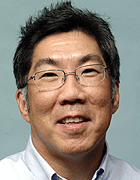Andrey Shaw, M.D., has been named the Emil R. Unanue Professor of Immunobiology in the Department of Pathology and Immunology.
Larry Shapiro, M.D., executive vice chancellor for medical affairs and dean of the School of Medicine, made the announcement April 27 at a symposium in Unanue’s honor.

“This is a well-earned recognition of Andrey Shaw’s status as a national leader in immunology who is especially prominent in the area of how T cells recognize invaders and contribute to the immune response,” Shapiro said.
“The new professorship, created via an anonymous gift to the department, also honors the fundamentally important contributions of former department head Emil Unanue, both as a pioneering immunologist and as the head of the department for more than 21 years,” Shapiro said.
Unanue, M.D., stepped down as department head last summer but continues as the Paul and Ellen Lacy Professor of Pathology.
“I feel very honored to have this chair named in recognition of Emil because he’s meant so much to my career as a scientist,” Shaw said. “He has had and continues to have a huge influence on my work, and he really taught me how to be an immunobiologist. I feel that much of who I am as a scientist is directly attributable to Emil.”
As the first Unanue professor, Shaw also becomes director of the new Division of Immunobiology within the department.
Immunology and immunobiology focus on understanding how the immune system recognizes and responds to invaders and how those mechanisms can go awry in autoimmune disorders and immune deficiency.
The term immunobiology recognizes the increasingly broad range of health concerns that scientists have started linking to the immune system, including growth and development.
Skip Virgin, M.D., Ph.D., the Edward Mallinckrodt Professor and head of Pathology and Immunology, called Shaw an ideal choice to lead the division.
“Andrey is a natural leader like Emil who has helped drive the development of immunobiology,” Virgin said. “He is well-suited to growing this tradition of leadership in the new division.”
Shaw describes the division, which has 15 faculty members, as an outgrowth of Unanue’s work to make the department “a world leader” in immunobiology.
“Given the size and eminence of the group that Emil assembled over his two decades as head of the department, we wanted to solidify the role of immunobiology both within the department and within the University,” Shaw said.
Shaw came to the medical school in 1991 as an assistant professor of pathology. At the time, he was interested in signaling and cell biology.
“I wasn’t really an immunologist when I came here,” Shaw said. “But Emil encouraged me to become one by, among other things, having me teach the immunology course to the first-year medical students. And he helped me focus on some of the important immunological questions of the day.”
T cells, a primary focus for the Shaw lab, are one of most important components of the body’s defensive immune systems. The cells are preprogrammed to recognize a specific chunk of a foreign invader when it is presented to them by another class of immune cell, the antigen-presenting cell. That recognition causes the T cell to set off immune alarms designed to mobilize the body’s defenses against the invader.